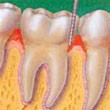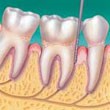Do I have gum disease?
In Britain today, 15-30 per cent of adults have chronic gum disease. Gum disease isn't always painful, and you may not be aware you have it. Therefore, it's important to have regular dental check-ups.
Gingivitis is the earliest stage of gum disease. If daily brushing and flossing do not remove the plaque it can build up and irritate the gum causing inflammation.

Early symptoms of gum disease can include:
- Red, puffy or swollen gums
- Bleeding gums after brushing or flossing your teeth
During the early stages gum disease can be reversed because the bone and connective tissue that hold the teeth in place have not been affected.
Periodontitis

- In the early stages of periodontitis, your gums begin to recede, exposing the roots of your teeth which may cause sensitivity.
- Receding gums can make your teeth look longer than normal.
- When your gums pull away from your teeth, small pockets form where harmful bacteria can accumulate. The pockets can be measured by your dentist or hygienist during a dental visit. If pocket formation is not treated, supporting bone around the teeth may be lost.
- Pus between your teeth and gums.
- Bad breath and taste.
- Loose teeth.
- Pain when you chew.
Healthy gums should be pink, firm and keep your teeth securely in place. Your gums shouldn't bleed when you touch or brush them.
What will increase my chance of having gum disease?
- Smoking significantly increases your risk of developing gum disease. Male smokers are up to 3.6 times more likely to lose their teeth than non-smokers, whereas female smokers were found to be 2.5 times more likely according to research published in the Journal of Dental Research.
2. Diabetes
Top experts in dental and diabetes research looked closely at all the latest research into diabetes and gum disease.
They found that:
- People with diabetes and severe gum disease have higher blood sugar levels compared with those with healthier gums.
- Even in you don’t have diabetes, your body’s control of blood sugar levels is not as good as it should be when you have severe gum disease.
- Having severe gum disease might increase your chance of getting type 2 diabetes.
- Stress A scientific review has found that stress can take a toll on your teeth, leading to periodontal disease.
- The authors also found that stress can lead to engaging in habits that increase the risk of periodontal disease, such as smoking or eating unhealthy foods, and forgetting to properly clean their teeth and visit dentists.
- Researchers thought cortisol, a hormone produced by stress, could lead to increased destruction of gums and jaw bone, and suppressed immune system, allowing bacteria to flourish.
- 57 per cent of the studies reviewed between 1990 and 2006 found a strong correlation between stress, distress, anxiety and periodontal disease.
4. Age
A recent CDC report provides the following data related to prevalence of periodontitis in the U.S.:
47.2% of adults aged 30 years and older have some form of periodontal disease.
70.1% of adults 65 years and older have periodontal disease.
- Poor Oral Health. Our mouths are full of bacteria, along with mucus and food particles it forms a sticky, colourless “plaque” on teeth. Plaque can be removed by brushing and flossing. If not removed plague can harden and form “tartar” that can’t be remove by brushing. Tartar can only be removed by professional cleaning by a dentist or dental hygienist.
- Medications that reduce salivary flow are associated with an increased incidence of periodontal diseases. Drugs that induce gingival overgrowth also appear to increase risk of periodontal diseases.
How is periodontal disease treated?
Our hygienists, Sarah, Emily or Megan will remove the ‘tartar’ (calculus) caused by bacteria from above the gum line by cleaning your teeth.
If your gums have pulled away from your teeth the hygienist will remove bacteria and calculus from under the gum by using an ultrasonic scaler and hand cleaning instruments.
Sarah will discuss how many appointments will be required depending on the severity of the disease. Patients with more aggressive forms of gum disease may be asked to take a short course of antibiotics after treatment.
She will also show you the best way to clean your teeth and gums to remove the bacteria. Good home care is important to ensure your periodontal treatment is as effective as possible.
Do I have to have treatment?
No, you can decide not to have treatment. However, with no treatment your gum disease could get worse. Your teeth could become painful or you may lose your teeth sooner.
Extractions may be an acceptable alternative treatment if your gum disease is severe. Extractions would reduce the time spent treating your gums and an extraction would remove a painful tooth quickly. An extraction may also be a suitable option if teeth are loose. This may mean you need replacement teeth such as a denture or bridge. Some people find it easier and more enjoyable to eat with natural teeth than a denture.
How can I prevent gum disease?
- Brush your teeth twice a day with a fluoride toothpaste. Don’t forget to clean your tongue. Bacteria and food particles get trapped on the tongue under a thin layer of mucus. You can remove this build up by using an amount of toothpaste and carefully brushing the top of the tongue and rinse with water. If you prefer you can use a tongue scraper.
- Flossing removes plaque and food particles under the gum line and between your teeth where a toothbrush cannot reach.
My teeth feel so clean. Thank you Sarah Russell for cleaning my teeth and showing me the areas I have to spent more time cleaning.

Ronel Van Der Spuy 20/20 Dental Practice
I'd never had a proper hygienist appointment before and I was experiencing some sensitivity around my wisdom teeth as they were just coming through so I was slightly worried that it may be painful. However, Sarah was so gentle that I honestly didn't feel a thing! Even when she was cleaning around my wisdom teeth where the gum was very sensitive, I didn't feel any pain whatsoever. She helped me see which areas I was missing and advised how to keep up the cleaning at home. She even gave me a demonstration on my teeth of the best brushing technique with an electric toothbrush to make sure I was getting the hard to reach areas at home. Altogether it was a very positive experience and Sarah's friendly attitude made the whole appointment feel very relaxed.
Natalie Andrews
Book your hygienist appointment now
By clicking the link https://onlinebookinguk.3pointdata.com/v1/view/organization/2070/index.html?pid=UKVDS01#/perspectives/3
